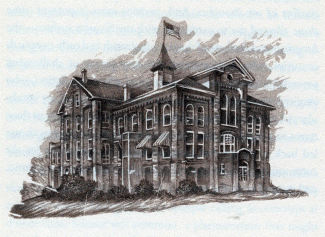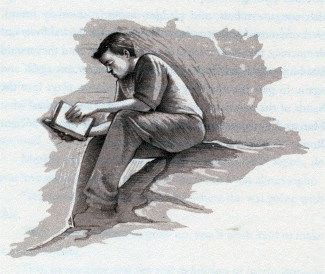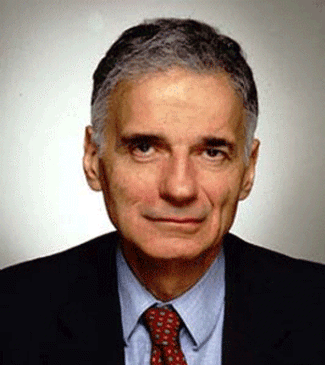17. The Tradition of Civics
My parents' philosophy was rooted in what might be described as the "civic golden rule" -- that neighbors should treat neighbors as they themselves would like to be treated. A deep personal sense of civic duty isn't usually the result of enduring didactic lectures, much less of studying bloodless civics books. True civic awareness is a flowing river with many sources -- some as small as rivulets and brooks, some as large as tributaries. In our case, the flow began at a young age, as we accompanied Mother and Father to the local town meetings where the community made its decisions.
At these meetings, our parents -- and anyone else who lived In the town and cared to participate -- had the chance to talk with the town's elected "selectmen," as the local representatives were called. A holdover from early New England history, the town meeting was a more pristine form of local democracy that has had no equal to this day. The public business of the town was put on display, and those townspeople who showed up regularly had few inhibitions about airing their opinions. When there was disagreement, nothing was sacred. An interested party would hardly think twice before calling out his opponent in purely personal terms: "Your father, Greg, would turn over in his grave if he could see what you're doing here."
Even as a boy, I noticed that these gatherings were often dominated by the same few voters, who took to the floor meeting after meeting and always seemed unusually well prepared for the occasion. By the time I was a teenager, helping out in the restaurant, I realized that these leading citizen activists were widely viewed as mavericks, and that some considered them oddballs or even deviants. The day after a tumultuous town meeting, people would point out Mr. Franz, a particularly motivated older resident, walking down Main Street. It was as if he were one of a trio -- the town drunk, the town fool, and the town citizen. Who is more foolish, I wondered -- the core group of committed voters and taxpayers who engage in the process, or the much larger number who habitually abstain from town affairs, leaving their interests to be decided by others? Later I was delighted, and not a little vindicated, when I discovered that the ancient Greek word "idiot" referred to civic apathy, not intelligence.
On the other side of the ethical tradition was the Golden Rule, and a host of similar pronouncements in the Bible that enhanced that simple call to help and get along with one another. For Dad, that was enough as a frame of reference. In the daily soapbox that was his restaurant, he was happy to discuss anything under the sun with his patrons, whether local or out-of-town. From local tradespeople to campaigning politicians, few survived a visit to the Highland Arms without having a vibrant conversation with my father. Those politicians were his special target; his counter, with its long row of seats, was an irresistibly efficient way to shake hands with a captive audience of voters. Dad always lay in wait down by the end of the counter, near the large coffee urns. And when his and the politician's hands clasped, he wouldn't let go until he had his say and got some response.
There's little doubt that, in the nearly fifty years he ran the restaurant, my father educated, motivated, and inspired tens of thousands of people to think more deeply about the issues that affected them as citizens -- right there in Winsted, and around the country and the world. To this day, I still meet people from near and far who recall their conversations with him. He covered much ground in these encounters -- from colonialism and the suppression of self-determination to government waste, from the shortcomings of the press to the improper relationships between government agencies and big business that favored them over small businesses, from the constant problem of inadequate parking on Main Street to the unnecessary demolition of buildings such as the classic railroad terminal at Winsted. He was constantly struck by the human capacity for greed. Dad was frequently dismayed by the performance of our presidents, the cowardly behavior of the major political parties, the willingness of Congress to vote itself large pay raises, and the exclusion of independent voters like himself from parts of the electoral process. He had a special reserve of contempt for chain stores and their migrant managers, who always came with excuses from central headquarters in New York or Chicago concerning why they couldn't contribute to local charities. The list goes on and on.
Father's zest for public debate was equaled only by his appetite for problem solving. He was a demanding citizen. In his daily round of civic conversations, he did more than just toss around the questions of the day. He helped orient and mobilize many local residents into taking action, whether through voting or protesting excesses such as Congress's large, ill-timed pay raises for itself. In 1978, at the age of eighty-six, his protest march attracted national media attention. When critical town services were being proposed, such as building a new hospital wing or a modern sewage system, he got into the debate on the ground floor, and stayed involved through completion.
He also made people think about aspects of civic engagement to which they might otherwise have given little consideration. He was fond of reexamining the conventional meaning of words -- pressing his customers to think of "wealth," for example, in terms of not just money or possessions, but also charity, health, happiness, and justice in a community. He felt sorry for the very rich (even as he trounced them), pointing out that they lived in what he called a "gold cage." He never prejudged any customer to be beyond his interest, or beyond the reach of his arguments. The firmer they appeared to be in their views, the better he liked it. He was not into convincing the convinced.
My mother's civic life covered a very broad range of involvements, from the usual charities like the Red Cross to the larger subjects that are faced by every community -- issues involving health, children, public works, and the like. From the time she moved to Winsted, she was struck by how insular people could be, especially when it came to international affairs. So she joined the local Women's Club, and helped to start an international committee that brought well-known speakers to address the club and its guests. When my older brother was stationed in Guantanamo Bay, Cuba, during World War II, Mother attended Spanish classes. And she became the first volunteer teacher of Arabic in the state's adult education program, which earned her a statewide television interview before any of her children had achieved any public attention.
As my mother well knew, the ethical fiber of a community is nourished by every small instance in which its citizens stand up for what is right. She encouraged her neighbors to write letters to the editor of the local newspaper, the Winsted Evening Citizen, but never hesitated to bypass that process and call the editor herself if she thought it would get quicker action. Mother really knew how to work the phones, in conversations that were short and to the point. Once, when the librarians at the Beardsley and Memorial Library were having trouble getting young people to return books, the local McDonald's offered to give a free hamburger to children who returned their borrowed books. Mother thought this was wrongheaded: Children should be taught to return books to the library on time because it was their responsibility, not because of some commercial (and caloric) incentive. She complained, and she prevailed.
When the monstrous Hurricane Diane demolished much of Winsted's Main Street in August 1955, she sprang into action. The storm forced the local theater to shut down for repairs, and when Mother realized that the young people of the community would need another recreational outlet, she promptly organized social programs for young people at the YMCA. But she also had her eye on a larger necessity -- preventing this kind of disaster from happening again. Given the Mad River's history of overflowing its banks, Mother realized that only a dry dam could protect the town from reliving the devastation with each future storm. So she pressed for a dam to be built a little north of Winsted, to tame the river.
For help, Mother decided to call on an acquaintance who had a connection to Prescott Bush, the state's Republican senator. Would the senator press for a dry dam? Alas, came the report, Bush responded with no more than a smile.
But my mother wasn't discouraged. One day, their mutual friend invited Senator Bush, the father and grandfather of presidents, to speak in the area. Mr. and Mrs. Nader went to hear him. After his speech, my mother went over and introduced herself. As she was shaking hands with him, she said, "Senator Bush, Winsted needs your support in getting the Army Corps of Engineers to build a dry dam to prevent future flooding."
Bush smiled, but said nothing.
Mother always loved recalling what happened next. "I wouldn't let go of his hand," she said, "until he promised to help." She had a tremendous grip.
And that, as it happened, made the difference. With the senator's help -- and no doubt that of others -- the Army Corps of Engineers did build that dry dam. There hasn't been a flood since.
"If you want to get a politician to stop smiling and start promising," she always said, "just don't let go of his hand." In other words, be persistent.
As children growing up in such a civically conscious atmosphere, we could have rebelled against our parents, as some children do. Instead, we were inspired to follow in their footsteps. Why? Perhaps because they led more by example than by didactic direction. They never took us by the shoulder and told us to be active citizens. We were simply immersed in the process from childhood, and we saw the results. What's more, we saw how much my parents enjoyed their involvement, no matter how controversial it got. The process had its ups and downs, of course, but their even tempers and sense of perspective always carried them through in good spirits.
From my parents, I learned the essential qualities that define the civic personality -- a blend of constant curiosity, inventive thinking, resilience in the face of obstacles, and a willingness to share credit with one's deserving colleagues. Of course, there are also countless skills that can, and should, be learned -- everything from how to interpret and disseminate a legislator's voting record, to how to use the Freedom of Information laws, to how to put on a good news conference. But in my years of public life I've found that it's those other, intangible qualities of human personality that usually make the difference -- and that are so often the legacy of one's family upbringing. No well-padded war chest, Ivy League education, or cutting-edge technology can take the place of such a personality, of such commitment.
Of course, there's no deliberate family recipe, or lesson plan, that can produce these traits. Some children will always want to rebel, and perhaps for the good; many more will simply go on with their daily lives, trusting that others will carry the weight of activism and engagement. But I feel sure that raising civically responsible children is most likely to happen in the kind of atmosphere my parents created: one of indirection and delights, strong examples and certain boundaries, solitude and conversation, witness and respect, and, above all, the strength of parental love and sacrifice. All of this cannot help but nourish a sense of dedication to help one's fellow human beings achieve a better life. And once this dedication takes root, it is likely to evolve into a self-starring maturity, into a personality that seeks out struggles for fairness and gets involved.
As I look back on our society's history, on our high points of civic courage and justice, it's clear to me that many of our greatest civic leaders must have been raised to engage with the world around them in just this way. Such values are what drive ordinary people to achieve extraordinary results. And, despite my concerns about the future, I am convinced that these "natural" leaders are still all around us, in each new generation, inspired by their sense of justice and eager to bring about change. These are our public citizens -- the architects, movers, and sentinels of a functioning, successful democratic society.
When I meet these confident, steady, refreshing figures, I like to ask them how they became the people they are -- how they developed such drive, such motivation and purpose. Quite often, they hesitate, then smile, and respond:
Well, when I was young, my parents ...
my mother ...
my father ...
my teacher ...
my neighbor ...
told me ...
took me ...
showed me ...
inspired me ...
For democracy cannot flourish without putting an arm around the shoulders of the young.



